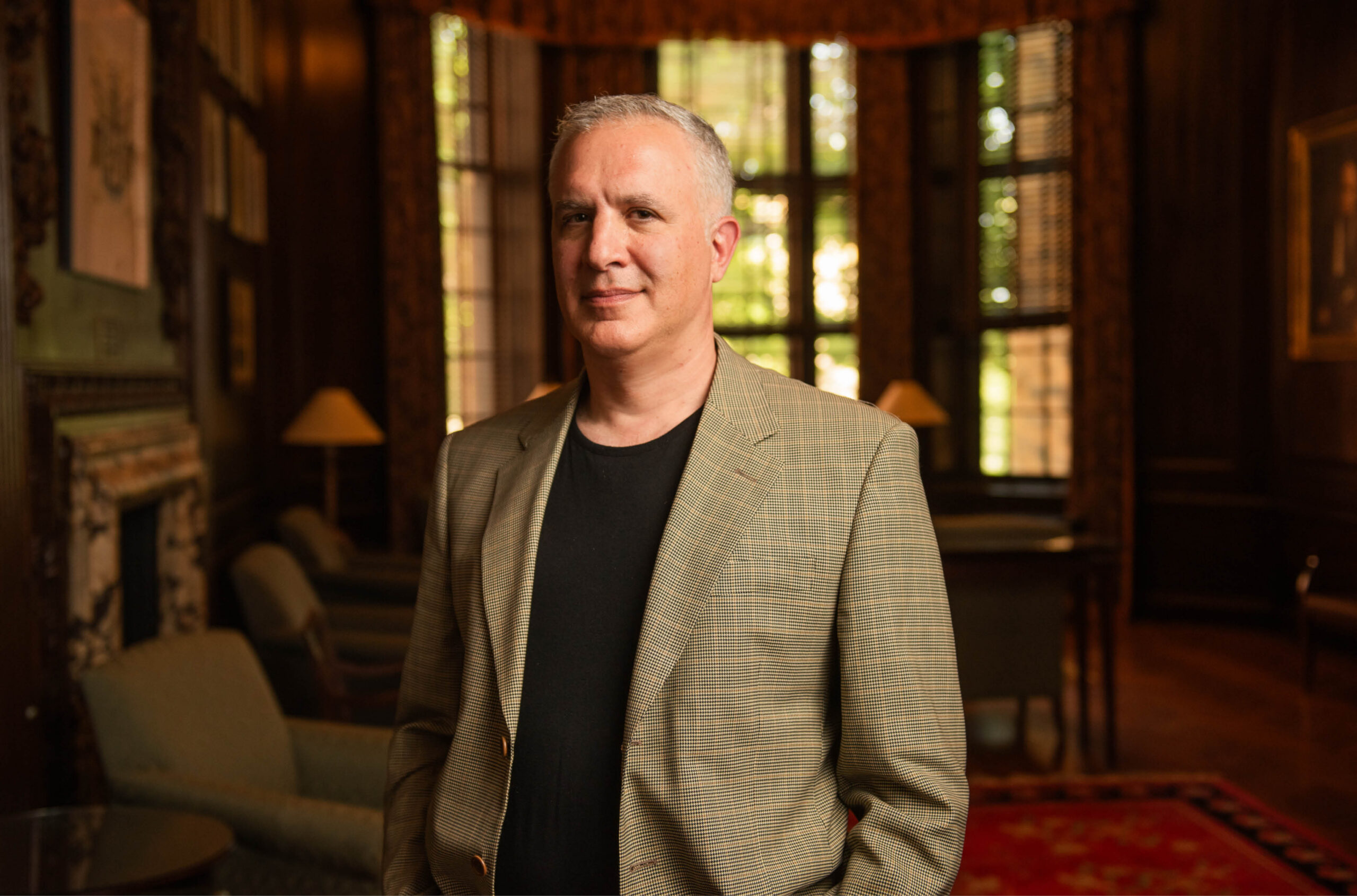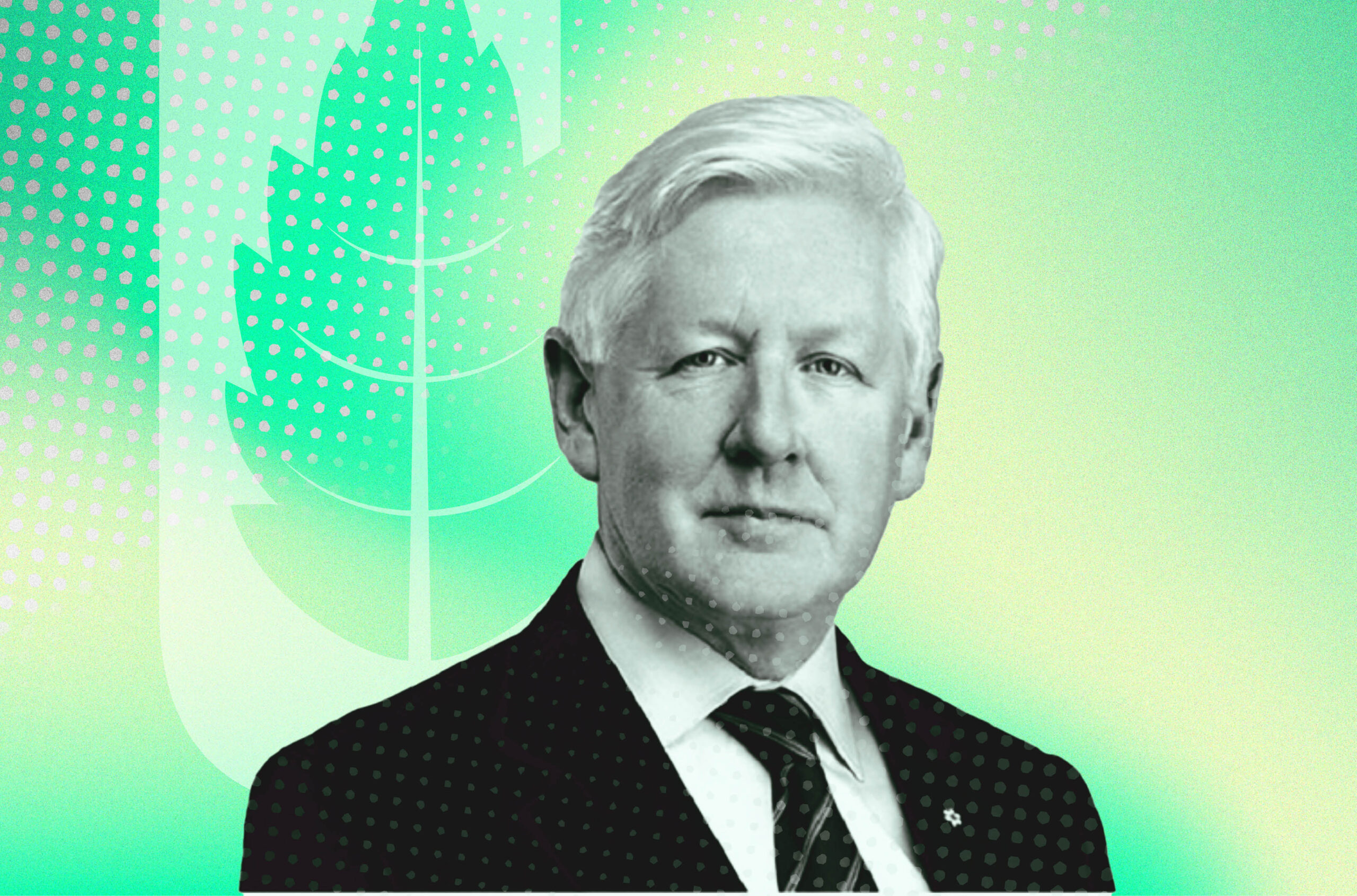Jordan Peterson’s personal crusade against the postmodern left
His characterization of postmodernism, however, appears rather suspect.

On occasion, an academic becomes so preoccupied with discrediting a specific position that his efforts turn into a personal crusade. A perfect example, in my mind, is University of Toronto psychology professor Jordan Peterson. His great obsession with postmodernism – the belief that interpretations of reality are contingent – was on display during an episode of the Joe Rogan Experience, a podcast that recently garnered widespread interest, with over one million views in just four days.
During the interview, Dr. Peterson was adamant that anyone who subscribes to postmodernism will, at best, “emerge nihilistic” or, at worst, become an “anarchical social revolutionary,” adding that postmodernism “rips out the ethical foundations” of students, leaving them “depressed.” His characterization of postmodernism, however, appears rather suspect.
First, what postmodernism says is that we only have access to the material world through human descriptions of it. Since we do not come equipped with a God’s-eye view of the universe, we must make do with the vocabularies that we have developed historically, such as those established in law, science, philosophy, ethics, politics, anthropology, sociology, etc. Since these vocabularies are often in competition with one another, various groups vie for the most correct interpretation of truth.
According to Dr. Peterson, what constitutes truth has shifted radically on university campuses. Referencing Nietzsche, Dr. Peterson claims that since God is dead and “all value structures have collapsed,” doctrinaire postmodernists have interpreted this to mean that truth is up for grabs. One’s version of truth is simply a “power game” – the product of a specific group’s interests, rather than a consensus. This, Dr. Peterson notes, was the “logical conclusion” postmodernists derived from the Nietzschean dilemma.
With all due respect, this is not an accurate description of Nietzschean philosophy. The “death of God” simply refers to the death of absolute values, not the negation of competing values. Yes, postmodernism teaches that immutable truths – those fixed for time and eternity – do not exist, but this does not lead to the relativist nightmare dreamed up by Dr. Peterson in which truths are “equally valid” or “anything goes.” The “death of God” does not mean all knowledge is suddenly deemed untrustworthy.
To resolve the relativist dilemma, claims are challenged in an open, adversarial forum, the purpose of which is to locate more nuanced interpretations of truth. Whenever competing claims are exposed to scrutiny, those lacking merit will be rejected while those with more credibility win out. In other words, the ideas of postmodernists cannot escape judgment. Since claims still require the marshalling of evidence to test their legitimacy, truth cannot be established by fiat or by the mere fact of one’s group identity.
Dr. Peterson also claims that postmodernists reject dialogue because they already possess the truth, so from their perspective, there’s no need to deliberate over complex moral quandaries or to achieve a negotiated understanding. Undoubtedly, this may be an accurate description of some of the activists that have confronted Dr. Peterson, but their entrenched positions are anathema to postmodernism.
As American intellectual Stanley Fish points out about intransigent individuals, “their way of talking and thinking couldn’t be further from the careful and patient elaboration of difficult problems that marks postmodern discourse.” Those who embrace rigid dogmatic beliefs are known as perfectionists, individuals who suffer from what Nobel prize-winning author Amartya Sen terms “the illusion of singularity.” Whenever someone posits self-evident truths and acts violently or aggressively to impose them, they are embracing perfectionism, not postmodernism.
Moreover, Dr. Peterson appears to believe that postmodernism’s most insidious quality involves the undermining of Enlightenment values, such as reason, but he is attributing to postmodernism a political agenda it does not possess. The subversion of logical analysis is certainly not one of its core objectives. Since truth values remain contested and contextual, human beings must continue to search for better ways to interpret their social, political, economic and legal environments. This quest for higher truths easily complements the Enlightenment’s emphasis on rational thought.
Dr. Peterson, it seems, remains convinced that the most extreme form of moral relativism – the idea that anyone can defend any behaviour by claiming it is important to their identity or culture – represents postmodernism’s true character. It doesn’t. But over a million people who watched Dr. Peterson on the Joe Rogan Experience podcast may now think otherwise.
Undeterred, Dr. Peterson continues his personal crusade against what he feels is the spread of postmodern propaganda by left-leaning professors. As a result, he has adopted a public persona that has become increasingly cynical and divisive, ironically, an outlook he now shares with the social justice warriors he vehemently despises.
Stuart Chambers is a professor in the faculties of arts and social sciences at the University of Ottawa.
Featured Jobs
- Soil Physics - Assistant ProfessorUniversity of Saskatchewan
- Engineering - Assistant Professor, Teaching-Focused (Surface and Underground Mining)Queen's University
- Human Rights - Assistant Professor (Expertise in Peace & Conflict Studies, Socioeconomic Rights and/or Indigenous Rights)University of Winnipeg
- Human Rights - Assistant Professor (Expertise in Human Rights related to Artificial Intelligence and Digital Security)University of Winnipeg
- Canada Impact+ Research ChairInstitut national de la recherche scientifique (INRS)
















Post a comment
University Affairs moderates all comments according to the following guidelines. If approved, comments generally appear within one business day. We may republish particularly insightful remarks in our print edition or elsewhere.
87 Comments
If Truth exists as a direction, as you seem to believe, then it matters not if it can be reached as a destination.
Dr Peterson, I believe, would have no real issues with you or what you are saying. He is fighting the folks who believe logic and fact must be rejected as tools of the oppressors.
Maybe they are not True postmodernists, but either way he could use some help from his colleagues.
First, the destination of truth does matter. The outcome of Hitler’s truth killed millions of people, whereas the outcome of Gandhi’s truth freed millions of people. The different directions of truth (truth claims) still have to be negotiated because as social beings, the outcome can affect others detrimentally.
Second, Dr. Peterson falls into the same trap as the social justice warriors he despises. Both make sweeping generalizations of philosophical and theoretical concepts. They adopt positions with no practical value or that are patently false. Read Dr. Peterson’s views on Islamophobia; they are just as dismissive as the social justice warriors who dismiss his views, and many of his views ignore fact and logic. They are simply ideologically driven (see http://www.ottawasun.com/2017/06/10/chambers-islamophobia-is-real-sorry-prof-peterson).
Third, one can only help a colleague by pointing out the error of his ways, not by supporting a personal crusade, which has consumed Dr. Peterson.
Sorry, if truth has a direction, or a destination, then there is only one. To me, that’s what the word means. All the rest is just belief. Your first paragraph makes no sense to me.
I suspect we are too far apart to even start a conversation, but I’d love to share a quote from Lewis Carroll. It was at the top of the course outline of my very first graduate class.
“I can’t believe that!” said Alice.
“Can’t you?” said the Queen in a pitying tone. “Try again. Close your eyes”.
Alice tried. “It’s no use,” she said. “One can’t believe impossible things.”
“I daresay you haven’t had much practice,” said the Queen.
We’ve all had way too much practice.
Lorne, if truth has one direction, then that would be liking having a God’s eye view of the universe. That’s what perfectionists or ideologues claim. They have “the” truth, and then they impose it on others so that it goes in the “one” direction they wish. The history of religious wars tells us that that is not a good idea for an efficient society. All postmodernism says is, this is the truth “for now,” until a new event of being, such as Martin Luther King Jr., comes along and shifts the social, political and ethical landscape. Once our comfort zones have been interrupted by a higher truth, we then renegotiate our moral/ethical boundaries. Truths have to be worked out because the acceptance of one versus another can cause massive suffering. For instance, one’s allegiance to the sanctity of life ethos in the euthanasia debate caused millions to suffer longer, which was one reason the sanctity of life principle fell out of favour in bioethics. We found a more compassionate way to address suffering, and the law in Canada changed, but it did not change on a whim. There exists volumes of evidence that showed how much patients suffered by having to stick out intolerable pain. And we will find better ways in the future to address other instances of suffering. That is the essence of the first paragraph. Higher truths need to be worked out. The alternative is imposition and violence. I would suggest reading two great books: Perfection by Michael J. Hyde and Identity and Violence: The Illusion of Destiny by Amartya Sen. Both highlight what happens when one attempts to enforce one truth rather than negotiate opposing views.
Professor Chambers, I appreciate your replies to commenters as much as the article itself. You are articulating ideas that I have been gradually working out myself. There is an irony in praising Jordan Peterson as a “champion of free speech” that his fans seem not to grasp. I have watched videos of Peterson angrily denouncing entire fields of study as useless or harmful, and saying that, if he had his way, contemporary humanities and social science programs would be “de-funded.” It is a strange champion of free speech who would silence whole fields of study that don’t conform to his own worldview. He constantly warns that leftist-liberal ideas will lead to totalitarianism, but when Peterson works himself into paroxysms of self-righteousness, he is unable to mask his own irrational resentments and totalitarian impulses.
Doug, instead of Peterson crying “free speech,” he should be asking: “What is the substance of my speech?” It’s substantive speech that should worry him more (or lack there of). This is what I mean by free speech versus substantive speech.
“Free expression: A means to substantive speech.” SAFS Newsletter: Society for Academic Freedom and Scholarship, April 2017: http://www.safs.ca/newsletters/2017/april/.
It is really amusing to read your comments about the negotiation of truth claims, while the examples you provide constitute an unabashed black/white-good/evil dichotomy. A hearty KEK indeed
Lorne, I guess I am not the only one writing about how individuals mislead their audiences about the postmodern left. Here is a great op-ed from the Globe and Mail. Jordan Peterson fans need to read it.
https://www.theglobeandmail.com/opinion/rational-thought-will-always-trump-lies-and-thats-the-truth/article35330899/?utm_source=Shared+Article+Sent+to+User&utm_medium=E-mail:+Newsletters+/+E-Blasts+/+etc.&utm_campaign=Shared+Web+Article+Links?subs
OK, I’ll try a response.
I believe Truth exists. I don’t believe that anyone knows or will ever know what it is exactly. I believe there are techniques like careful observation, rational thought and repeatable experiment that can get us closer to it. So if you say an argument is “higher” and I say it is “closer to the Truth” I think we are saying the same thing.
To me, your examples of the terrible things done “in the name of truth” read like an argument that we should not let anybody believe that Truth exists in case a small number of terrible people mistakenly start to believe they know what it is and start to do terrible things. I think it’s pretty clear that the terrible people are not listening and even if they were, terrible people will do terrible things regardless – even if all they believe is that their “truth” is slightly better than yours.
Most of all, I think it is essential to separate positive from normative. Positive is about what is, normative is about what ought to be, and you can not logically derive an “ought” from an “is”. Positive truth is utterly devoid of normative implications.
This is where, in my opinion, many arguments from both the left and right fail miserably. To paraphrase Steven Pinker: “If you believe everyone should be treated the same because deep down inside everyone really is the same, you are putting your normative beliefs into a situation where they might be contradicted by the facts.” Of course if you believe the fact that people are different justifies their different outcomes in society you are making exactly the same mistake.
We’re all educators here. I think we will do a lot more good teaching our students to keep positive and normative separate than we will by teaching them that truth (in particular, positive truth) does not exist because we are worried about the normative implications they might mistakenly draw from it.
Lorne, your “closer to the truth” and my “higher truth” are similar, and I do not disagree with your distinction between normative and positive. However, if higher truths exist, they must be worked out over time, and they are not absolute. They shift with the social, political and ethical landscape.
Lorne, sometimes positive truth (i.e., data, surveys) is not enough to convince them of your truth. The data indicates that Muslims in overwhelming numbers reject violence (and reject ISIS), but people still fear Muslims, hate them, or demonstrate overt prejudice against them. Dr. Peterson, Mark Steyn, Bill Maher and Ezra Levant are perfect examples. To them, Islamophobia does not exist, and data has not convinced them otherwise (I guess Norway mass murderer Anders Breivik did not convince them either). In another example, how would one decide the euthanasia debate in Canada? One can make a normative judgment of right or wrong, and both qualitative evidence and quantitative evidence can guide our answers (positive truths). But the interpretation of these truths shift depending on one’s moral foundations and normative assumptions. If you believe in the “sanctity of life” ethos, you will come to a different conclusion about data than someone who believes in the “quality of life” ethos. A sanctity of life advocate will view a “slippery slope” simply by the fact that society is going to allow mature minors access to medical assistance in dying. You can present all the data you want (positive truths) that shows the slippery slope is a myth, but if I believe in the sanctity of life, then mature minors being euthanized is de facto reckless policy. That’s why a conversation must continue. Data alone is often not enough; you need to be persuasive in dialogue with others, and rhetorical eloquence is part of that. You have to keep framing your argument using different angles. People are often not convinced by the first data chart they see. They need to keep talking to internalize an argument. Various disciplines kick in here, including history, philosophy, ethics, sociology, etc. Truth can even be found in irony, hypocrisy, and oxymoronic situations.
Lorne, just to reiterate, we are closer in terms of our understanding of truth. “Higher truths” and “closer to the truth” is essentially the same thing. I just do not believe in absolute truths fixed for time and eternity because that is not a human reality. Those who do believe in capital T truth often do violent things. The Hitler/Gandhi comparison was just to illustrate that point. When it comes to ethical issues, like the current euthanasia debate, getting closer to the truth is what we have been doing for decades. But nothing happens too quickly because of competing claims/political needs. That is the reality of life. In euthanasia (assisted suicide), different people require different needs, so different solutions may be required to resolve their suffering. But these solutions are still bound by constitutional law. In a pluralistic society, the individual can decide this good within legal boundaries. I do not disagree with your normative/positive distinction in teaching, but ideologues require more than data charts to be convinced that their version of truth causes more suffering or inefficiencies. My two cents.
Hi Stuart,
Some time back I said I suspected we were too far apart to even start a conversation, and I’m happy to admit I’ve been proven wrong. (Although, I suppose, what I really might have meant is that we will never finish it – in which case I’m still right!)
I’m happy with almost everything you say about “truth” so long as I substitute the word “belief” every time it appears – Hitler’s “belief”, Ghandi’s “belief”, and so on. I don’t understand why concepts such as “beliefs” and “lived experience” have been elevated into “truths”, or even “personal truths”. To me that just demeans the idea of truth, and at the same time it demeans the academic mission.
Some years back I was chair of a PhD defense in one of the disciplines that Jordan Peterson finds so troubling. The student had a well defined hypothesis and had collected and analyzed some data. The external examiner was particularly tough, and in my opinion had punched some significant holes in the argument. At the end, however, the external examiner asked the student if they still believed the hypothesis. The student said yes, and the examiner said, basically, “Well. OK then. If you believe this strongly enough, then that’s fine. That’s all that matters.” The committee then voted unanimously to pass the student.
It’s not my place to tell colleagues in another discipline how to conduct their affairs, any more than I would accept their criticism of mine, so I said nothing. But I was appalled. If given the opportunity to influence a young student entering that discipline I would certainly try to explain why I thought it was not in their own best interest.
I should say that when I relayed this experience to my wife, who is smarter than me in a hundred ways, she just said “Lorne, you don’t understand. To lots of people, feelings are Real.”
So call me a dinosaur. Or autistic. Or a male. Whatever.
I’ll keep checking this space, but the editors may soon run out of patience. Anyway, it’s been fun.
Do you see a distinction between muslimphobia and islamophobia?
Peterson isn’t putting ideas into people’s head like SJW’s do, it’s the fact he’s saying what people can’t articulate as eloquently that makes him so popular.
Bill, when it comes to Islam, Peterson is merely reinforcing existing prejudices in others. See this article and then tell me if Peterson understands Islamophobia: http://www.ottawasun.com/2017/06/10/chambers-islamophobia-is-real-sorry-prof-peterson
Bill, certain words catch on for different reasons, and Islamophobia appears to be the word that the general public accepts. Any form of bigotry has a “fear” attached to it in some way or another, so it is a word that connotes a fear of Muslims and Islam. The article below may help clarify things:
Basu, Tanya. “What does ‘Islamophobia’ actually mean? A brief history of a provocative
word. The Atlantic, 15 October 2014: https://www.theatlantic.com/international/archive/2014/10/is-islamophobia-real-maher-harris-aslan/381411/
Wait a minute. “Hitler’s truth”? Hitler “had” a truth? This I thought you were arguing that postmodernists only hold that INTERPRETATION of truth is contingent. Your phrasing here appears to imply something much stronger about your own position — and the same language rolls off the tongue of those who regard themselves as postmodernists at all levels.
You don’t have your own truth. You have an opinion. Truth respect your contingencies. Hitler had a worldview, a systematic opinion about the grand scheme of the world. Parts of it, no doubt, as with everyone’s, happened to correspond to truth. Much of it, as with everyone’s, fell short of reflecting the truth. But he did not have a proprietary, perspective-contingent, brand of truth. No more did Gandhi “have” a truth. He had a worldview, different from that of Hitler. And to some degree Gandhi’s worldview corresponded to truth. In other respects, it did not.
Hi Professor Craigen. Call it what you want. Hitler’s “truth” or worldview was contingent on what he knew, which was very limited and distorted. The good news is that once his worldview competed with others, his was rejected. In other words, competing truths need to be worked out in dialogue with others because we are all tied to our own contingencies or disciplines of understanding the world. Last I checked, Hitler’s “opinion” or worldview was discredited. Gandhi’s “opinions” are respected. Sounds about right to me. 🙂
“Hitler’s “truth” or worldview was contingent on what he knew, which was very limited and distorted. The good news is that once his worldview competed with others, his was rejected.”
You mean he lost the war.
“In other words, competing truths need to be worked out in dialogue with others because we are all tied to our own contingencies or disciplines of understanding the world. Last I checked, Hitler’s “opinion” or worldview was discredited. Gandhi’s “opinions” are respected. Sounds about right to me.””
Wow. Just a few points worth noting: (1) “Hitler’s truth” wasn’t a “competing truth” that needed “to be worked out in dialogue. It was a bloody great war! (2) On the basis of what you have written, Hitler’s truth would have been just peachy if he’d won the war instead of losing it, which given even a crude knowledge of history, was a distinct possibility (all he had to do was no declare war on America and the outcome would have been different …).
All I can say is that you have pleasantly explained to me exactly why so many academics are perfectly willing to countenance Communism even though Stalin killed more people than Hitler ever would before Hitler even got started, to say nothing of Mao, Pol Pot, …. I think I’ll stick to a world in which truth matters, thanks.
Using the term Islamaphobia is an attempt to protect Islam from criticism, or from competing worldviews.
Yes, there are people who will latch on to criticism of Islam in an attempt to reinforce their bigoted views, but they are no worse than someone such as you who cannot believe that Islam could be an extremely poisonous set of teachings and religiously sanctioned bigoted attitudes.
If you have PhD then you just be a researcher; however, I consider your research into the foundational texts of Islam to be shallow. Do you have some underlying bigoted views that are stopping you from taking your research deeper?
Greg, please keep the discussion civil. Be specific with a clain you are making rather than resort to juvenile comments of bigotry.
Lorne, thanks for e-mailing back. We are basically talking about the same thing, but it is only a matter of word choice. “Beliefs” or “feelings” are not really adequate substitutes for truths because intution is often just a “gut feeling” based on myths. Feelings have no basis in fact. Stephen Colbert would call this “being truthy.” If it feels right, it must be true. I can believe (or have the feeling) that mediation or prayer cures cancer, but that is not the case. So perhaps we can settle on “higher truths.” They are based on the best evidence we have for now, but we know they can shift in the future. That is a postmodern way of looking at life.
The problem is that science and “logic” HAVE been used (and abused) by the Powers That Be to lord over others. As a matter of fact, science and “logic” have also been twisted and altered beyond all recognition in order to achieve the goals of the Powers That Be. And THAT is what postmodernists want us to understand, to see… that it’s almost never so simple and reductive as the scientific worldview would sometimes have us believe. Two great texts re: this subject are The Dialectic of Enlightenment by Horkheimer and Adorno, and Voltaire’s Bastards, by John Ralston Saul.
Yes Jerky, any foundation can be used and abused. It is important to be aware of the many ways this is done. But none of this negates the need to weigh truth values, which is the hard work in postmodern thought.
There are more moderate views which go under the banner of ‘postmodernism’—views which are not incoherent, which do not lend themselves to destructive behaviour, and which are eminently sensible and well-founded. “[T]he belief that interpretations of reality are contingent” is the weakest, most innocuous form. Who doesn’t believe that?! But there are also stronger versions which are incoherent, destructive, and nonsensical—and are unfortunately not rare or uninfluential. It is these which Dr. Peterson warns of. Perhaps he can be faulted for not clarifying that there are less-problematic views also called ‘postmodern.’ And perhaps he can be faulted for not discussing this in the nuanced academic manner of careful distinctions, rather than the manner of clearly-more-effective-public-rhetoric. But then, given the nature of what he is warning of, this may be the most appropriate response. Fight fire with fire. Though it feels like fighting a forest fire with a lighter, at least this lighter believes in the import of rational argument.
Jonathan, I understand where you are coming from, but Peterson falls into a trap of his own making. If the social justice warriors he despises are rigid in their beliefs–and are unwilling to listen to and be influenced by opposing viewpoints–then they are in good company. Dr. Peterson refuses, as you say, to accept the nuanced ways in which postmodernism is defined and applied. He does not tell his audience what it generally means, which is an egregious error in itself; he just generalizes by claiming it leads inevitably to a relativist nightmare. That is like saying “multicultural theory” eventually leads to a relativist nightmare of everlasting tolerance–for instance, that immigrants with violent political or personal beliefs must be tolerated under a multicultural ethos. Multiculturalism does not say that and never has, but prejudice people might believe it, so I guess anyone can make that bogus claim too. Dr. Peterson has shifted gears and and now targets anyone who believes in Islamophobia (they too are postmodern radicals who believe in “tolerating anything.” Really? Peterson just dismisses Islamophobia out of hand and is not willing to listen to the evidence that Islamophobia is a reality that can be proven empirically. In this regard, he shares a stubborn reluctance with social justice warriors to avoid honest debate, or as you say, “rational thought.”
When one criticizes the interpretation of someone it is helpful not committing similar errors oneself. I agree that Dr. Peterson is incorrect when he applies a label [postmodernism] to the views he opposes. That does not put him on a ‘personal crusade’ however. The specific practices Petersen objects to are reprehensible indeed, regardless of the label one attaches. Furthermore, Stuart Chambers seems to imply that postmodernism is just one well defined set of beliefs. It is not. Depending on which of the many authors who consider themselves postmodernist [or are so labeled] one prefers, one can come away with very different views of postmodernism. Chambers is correct to point out that not all postmodernists propose the ideas Petersen objects to. But he is incorrect to imply that none do.
Chambers claims: ‘To resolve the relativist dilemma, claims are challenged in an open, adversarial forum, the purpose of which is to locate more nuanced interpretations of truth. Whenever competing claims are exposed to scrutiny, those lacking merit will be rejected while those with more credibility win out.’ One would wish that were so. However, the recent events on university campuses in North America have clearly shown that the willingness to even listen to views one considers in conflict with one’s own truth has been diminished to the point that proponents of those views are physically attacked. In my opinion it would be helpful to address THIS problem.
Okay Christina, let’s address the issue of radicals on campus who shut down debate. We would need to know a few things: What is their discipline of study? Did they even take philosophy? Do they know what postmodernism means? Who were their biggest academic influences? Peterson can claim that all of life’s ills are due to postmodern philosophy, but unless a study is conducted that answers these questions above, then he is just guessing.
In terms of Dr. Peterson’s latest crusade (and by that I mean any view he dismisses out of hand repeatedly for ideologically driven reasons), see: http://www.ottawasun.com/2017/06/10/chambers-islamophobia-is-real-sorry-prof-peterson). Instead of taking a cynical, dismissive view of postmodernism and Islamophobia, perhaps he should start by examining his own subject limitations and prejudices (psychologist, “know thyself”).
When you tell us that post-modernism says that “truth is contingent”, that “there are no absolut truths” and “only by confrontation of ideas can we came at higher ideas”, does that apply to these principles as well? Let’s say, “there’s no absolut truths”. Is it possible to challenge that ideia? If we do so and find out that a higher one says the opposite, would’ve we be destroying the basis is post-modernism.
In fact, would not these affirmations, by themselves, be show that post-modernists actually believe in some absolut truths (that there are no absolut truths)?
How can you affirm any of these principles without them being absolut truths in the universe? And in case they aren’t (which your claim ultimately leads to) they’ll will end up being replaced by a higher ones, ultimately destroying the “foundations” of post-modernism.
Hi Rafael. When you say, “How can you affirm any of these principles without them being absolute truths in the universe? And in case they aren’t (which your claim ultimately leads to) they’ll will end up being replaced by a higher ones, ultimately destroying the “foundations” of post-modernism,” you are, in fact, describing a process of positive nihilism supported by the postmodern philosopher Gianni Vattimo (in his book “Nihilism and Emancipation”). Truths once posited as solid then weaken over time, only to be replaced by truths with more credibility, truths that are more life-affirming, efficient, and humane. Your observation does not undermine the foundations of postmdoernism; they confirm them. Another book that explains this–one that is short but it is a gem–is the following: Kazantzakis, Nikos. Friedrich Nietzsche on the Philosophy of the Right and State. Albany: State University of New York Press, 2006.
I would ve very interested to hear your definition and defence of the philosophy of postmodernism. In fact Peterson encourages and in fact demands that each person partake in such rigorous inquiry before arriving at their opinion.
To disagree or take issue with Peterson’s definition and concerns with postmodernism is fine. But unless you are able to present your own definition and defence of your position; ie what it means to YOU and what value YOU believe it has offered society, I would suggest it is YOU who is “so preoccupied with discrediting a specific position.”
Sure Denise. I defend postmodernism because it reminds us that knowledge is historical: it all came from some human or era somewhere. It does not claim a God’s eye view of the universe. If anything, it promotes humility. Since postmodernism rejects absolute values–and the impositions derived from them–it avoids both metaphysical spats, which cannot be proven, and ideological/self-evident claims of radical activists. Postmodernism also demands that since truth claims are historical, they need to be worked out and that knowledge is important. Hence, postmodernism complements politics, rational thought and acknowledgment. Overall, it takes hard work and nuance to create shifts in the political, social and ethical landscape, and postmodernists contribute positively to these kinds of debates. Jordan Peterson adopts a glass-half empty approach to postmodern philosophy, and I am not convinced he has studied it with any real sense of balance. His approach is reactionary, not mature.
“Jordan Peterson adopts a glass-half empty approach to postmodern philosophy”
If your academic subject isn’t 99% full, perhaps you need to revisit your subject, since it is clearly lacking.
Dr. RTFM, unlike Peterson, my approach is glass-half full. I always attempt to see how a specific discipline complements another one or can make a life-affirming contribution to society. Postmodernism is a perfect example. I do not see it as a threat to humanity; I see it as a benefit. Peterson does not. Here is what I think happened to him. When Peterson was a child, a postmodernist walked up to him and yelled “BOO.” Since then, he has been frightened to death by their presence. 🙂
Dr. RTFM, when you say that “so many academics are perfectly willing to countenance Communism,” I am not sure what this assertion is based on. I am not one of them, and I have no idea why you would assume this.
The issue with Peterson characterizing bad behavior as postmodernism is that postmodernism’s logical end comes out to self-skepticism, nuance, humility – all of these things that the campus radicals lack. They are the opposite of postmodernists; they become absolutists, brimming with certainty.
Canard, I agree. Peterson’s determination to blame one philosophical discipline for the actions of campus radicals is too simplistic. Here is his basic methodology: A) Jordan Peterson dismisses Islamophobia outright (see: http://www.ottawasun.com/2017/06/10/chambers-islamophobia-is-real-sorry-prof-peterson); B) this is a radical stance that is very rigid and without compromise; C) postmodernism is to blame for this “anything-goes” attitude. Perhaps Peterson’s dismissal of Islamophobia is rooted in a Christian bias, or perhaps it is rooted in an anti-Islamic bias. Who knows? But blaming a philosophy for those who shout down free speech is unconvincing. Speech was shouted down long before anyone ever heard of the word “postmodernism,” a philosophical belief system that most students do not read or even understand, so how could it be influencing them? We cannot blame Nietzsche for the actions of ideologues. Peterson needs to work this out for himself.
The gay and lesbian community has for decades scrupulously avoided any discussion that would declare their conditions are ‘ naturally occurring in nature, but not normal. ‘
They have always declared that thier conditions are rooted in biology; “we are born this way”.
The fact that I’m a man who instinctively desires sexual intercourse with another man [no interest in vaginas] is my biological urge, its ‘naturally occurring in nature [and they would argue ‘normal’]. ” It’s biological. ”
As Peterson explains, marxist social justice warriors cannot have it both ways;
Gays claim origin in biology however non-binaires claim biological sex/gender has no claim on them. For them they claim thier gender is a social construct. Maliable, evolving, in some cases daily changing. Not rooted in biology.
And it is these two arguments that are in direct opposition.
I’d add that whilst we should be accepting of those born with naturally occurring but not normal conditions, we as a society should also be working hard to discover the causation for these genetic defects.
Life is hard enough, without being born with the weight of confusion and disassociation of not being attracted to the opposite binary gender for the sake of procreation.
In the most agregious SJW arguments, we are also talking about a group of people who claim that hetrosexual procreating sex [a biological act], is male violence on women. Hog-wash !
These same people have turned the entire post-secondary education sector into a standing joke. Something that needs to turn around. Imagine entire classes of pshyc students who cannot discuss 90% of the curriculum, because of thier ‘feelings’ might be triggered. How the hell are you going to survice in the adult world ?
Hi Theo. i have taught for 26 years, and those students who require “trigger warnings” and safe spaces are few and far between. Peterson makes it sound like an epidemic; it’s not. I almost never encounter students like this because most understand that they must work hard and compete with others to gain an honest grade. Extremist views like the one you mentioned about a “group of people who claim that heterosexual procreating sex [a biological act] is male violence on women” are even rarer. Almost on one believes this. To reiterate: these views are not common on a university campus.
How exactly do you test values in an open adversarial forum? Values are qualia related, not materialist. Any debate of physical evidence presupposes some sort of value system. What Peterson is partially (although indirectly) getting at, in the tradition of much greater thinkers than him, is that society can only function optimally with a firm infrastructure of values, just as it requires a solid physical transport infrastructure.
Post modernism rejects the idea of “superior” and “inferior” which is absurd and harmful for social function since the preservation of any cultural structure requires an implicit judgement that it’s negation is inferior. Preserving monogamy, for instance requires the implicit judgement that polygamy is an inferior system for example.
Hi Jonathan. You basic premise is wrong, as is Peterson’s. Postmodernists do care about the value or quality of knowledge. They just do not automatically assume you possess it. You have to prove it against claims from other disciplines. A fantastic article on this was recently written in the Globe and Mail; check it out: https://www.theglobeandmail.com/opinion/rational-thought-will-always-trump-lies-and-thats-the-truth/article35330899/
So you say that the death of god doesn’t mean the dissolution of all value structures and claim that this isn’t something that Nietzsche was talking about at all, but then if this is true then why was he constantly clanging the warning bells about the scourge of nihilism that would result from it. What the hell is nihilism if not the dissolution of all value structures?
Your criticism of Peterson saying that he claims that “postmodernists reject dialogue because they already possess the truth” is also completely inaccurate. His claim is that the postmodernists reject dialogue because they don’t believe in absolute truth, not that they have already got their own. They think that all of the ideas they are competing with are simply attempts to enforce some kind of power dynamic, usually group identity based. This is the central point and it cannot be overstated: The postmodern left rejects all dialogue as simply being an attempt to enforce some kind of power dynamic. They do not believe in the power of the spoken truth or articulated argument. You constantly see this in the fact that the postmodern left will constantly refuse to debate with their detractors, or the constant deplatforming happening on college campuses, always with a similar reason like “I don’t want to give their ideas legitimacy be addressing them or giving them a platform for expression,” which is exactly what Peterson is referring to. When professor Brett Weinstein was being inundated with accusations of racism and was asking at a meeting when he would be allowed to defend himself from these accusations he was that he “should not expect a platform from which to defend himself.” How you cannot see the connection between postmodernism here and the attempted destruction of the enlightenment values of truth and logical analysis is completely beyond me.
But ultimately whether you are right or not about the influence of postmodernism on the current political climate doesn’t really matter that much in comparison to the reality that the things that he is claiming postmodernism are making manifest are really occurring. You seem unwilling to address that we are actually seeing a loss of belief in the power of rational argument and logic spreading throughout academia and government. You completely avoid the fact that this new brand of identitarian resentment politics is virtually indistinguishable from the class based resentment that brought the deaths of tens of millions in Maoist China, Soviet Russia and many smaller similar regimes. This article shows some of the worst in detached intellectualism. We have big problems with the ideas that are spreading throughout our society and all you want to do is say “oh i don’t really think that he has accurately linked these things with postmodernism so why is he wasting his time with this.” Why even bother with this line of reasoning if you arent interested in talking about the key issues that he is blaming post modernism for, which are ultimately the key reason for his “crusade.” It is such a milk-toast, lame, detached, and frankly masturbatory stance to take.
We have serious problems here, maybe write about the actual issues instead of making little jabs about the accuracy of his linking the problems to postmodernism then dropping out.
I would love to hear your response to this
A great scholar who understands Nietzsche is Gianni Vattimo. His classic “Nihilism and Emancipation” (2003) heavily emphasizes “positive nihilism.” Basically, once a long-standing claim is discredited (it no longer is of value–it becomes of “nothing”), a new one take its place that is more credible (“positive value”). In the abstract, something of value can come from something that no longer has value through a process of value exchange (debate over the merit of competing claims). In his 1909 dissertation, Friedrich Nietzsche on the Philosophy of the Right and State, Nikos Kazantzakis reminds us that once absolute values are jettisoned, humankind “erects a new ranking of values and new ideals of humanity, society, and state.” Hence, there is no unchangeable doctrine or final ethical boundary, just continuous challenges that redirect us towards higher truths. It’s not inevitable, so we have to constantly work at it. We could choose Hitler over Gandh, but we now reject the former’s values outright; however, since truth is found in dialogue with others, it’s important to keep the dialogue going. Therefore, dialogue is essential to postmodern thought. Anyone who shouts down others and refuses to listen may have learned their rigid stance from another source other than postmodernism. Many undergrads have never taken a philosophy course and have never learned its theories; some cannot even understand postmodern thought, so we would need to learn the sources of their activism. But these people are a very low percentage of the student population who are far too busy learning. They have little time for juvenile activities like breaking windows and shouting down professors. I guess I am not the only professor who feels that Peterson is grossly exaggerating his depiction of postmodernism. Here is a brilliant op-ed in the Globe and Mail recently by a University of Toronto philosopher (unlike Peterson, Mark Kingwell has a degree in philosophy and understands the issue at a higher level). See: https://www.theglobeandmail.com/opinion/rational-thought-will-always-trump-lies-and-thats-the-truth/article35330899/
Your claim to be a professor is surely a postmodern claim, is it not?
Joel, A+ for humour!
I don’t see Peterson as cynical and divisive. Opinionated and not sugarcoating his attitude toward the neo-marxist left for sure. But that is the battle line that is drawn up and it took somebody like Peterson to stand up to the undermining of our educational institutions by radical ideologues. This is a battle that will not be won in the short term. It requires determination and aggressiveness. That is why Peterson resonates with so many people because they have had enough of all the bullying and now real life violence against dissidents (aka non brainwashed people with common sense).
Steeevyo, radical ideologues exist on both the left and the right, and their tactics are similar. Peterson spends too much time emphasizing left-wing ideologues and not enough time showing the tactics and bullying of right-wing ideologues. See below for a balanced approach.
http://www.safs.ca/newsletters/2017/april/3%20Stuart%20Chambers%20FREE%20EXPRESSON%20A%20MEANS%20TO%20SUBSTANTIVE%20SPEECH.pdf
Isn’t the concept of “left” and “right” thought (and therefor the “extremes” at both ends.contrary to postmodernist philosophy?
Thanks for an good, balanced article. I have been following the debate swirling around Jordan Peterson since his theatrics concerning Bill C-16 turned him into a media star. Peterson may be a brilliant psychologist. I’m not qualified to judge that. But with my background in the humanities, I am qualified to judge, at least for myself, that some of Peterson’s sweeping generalizations beyond his own field of expertise are shallow, uninformed, and sometimes paranoid. I don’t consider myself a Postmodernist, but I do think there is an important lesson to be gleaned from some of the Postmodernists: epistemological humility. That is a philosophical value Professor Peterson lacks.
Doug, you are indeed correct. Peterson lacks humility and nuance. His problem is that he only listens to himself.
Nice to read a balanced and intelligent piece. Most of the articles on him and on his page have been ravaged (and perhaps some part of his own psyche) by downtrodden angry young men, many of whom seem like naive undergrads who are only learning of ‘the world’ now. I quite enjoyed many of his talks years ago on mental health, although when I sent a video to a friend who was suffering from extensive issues, she replied she couldn’t understand him.
I stopped listening to him because I stopped listening to podcasts for lifestyle reasons, and was shocked to find him in the news recently with some very different things to say than what I would have expected, making outrageous and false statements about gender. I agree that forcing people to use pronouns in unusual ways is wrong, but he says much more than that. If you watch the video from when he was protested and ended up outside on the street giving a speech, he uses the word binary to describe gender. Problem is that is a computer science word, yet biologically there is a lot of weird stuff going on with variations in gender, but listen to him speak about gender he never once goes into any detail whatsoever about the biology of gender. He considers it so obvious that it doesn’t need to be described at all, and waves his hand to the invisible Biology Department, as though they agree with him. I speaks strictly as a philosopher, accusing the other side of being too flimsy.
He even uses the existence of trans individuals (apparently 2 of them really like him) as a reason to dismiss the existence of androgynous individuals, pretending it is ideology that has created them instead of biology. Does he think that SJWs have gone around infecting so many cultural icons, David Bowie? Eddie Izzard? George Sands? He repeatedly denies the existence of such people, who do not either stay their gender or completely reverse it, and exist somewhere in the middle. Impossible he says, but his rejection of a spectrum for gender identity just so happens to conflict with my own life and experience, and the many who also identify and behave as such. I realized this year than in some contexts it would be necessary or helpful for me to articulate that I don’t identify with my gender, but neither do identify with the opposite gender, and I am completely straight. All of the famous people I mentioned do not fit in with their gender identity but at the same time are still attracted to members of the opposite sex. This is the reality of so many that Jordan Peterson has repeatedly denied.
He is so far out there now that he has confirmed a big theory of mine, which is that psychologists are crazy, and if you spend enough time with people dealing with problems you will start to take on their problems. I noticed too that in most of his videos and photos he doesn’t smile, and he has said that he does not believe that happiness is a worthy goal. Since most mental illness is described as being unpleasant or uncomfortable either to oneself or others, one would think the goal of psychotherapy is happiness, and people make that assumption. He is a far cry from some of the Buddhist ideas he has discussed, and seems to fall back harshly into his upbringing in Christianity. What a disappointment. He warns against most of the things that he has fallen prey to himself, remaining a true idealogue. Although I gather that he may have some things to say at sometime in the future, we’ll see if he can get over his masculinity issue and sort himself out.
Yes Kim, Peterson has turned into an ideologue on a crusade to show how “misguided’ the left is. There is no balance to his arguments, as you have discovered. Right-wing ideologues and their tactics are rarely mentioned by Peterson. He’s too busy blaming postmodernists for all of life’s ills. This is the “neat and tidy” world of an ideologue.
There’s no doubt Peterson is at best misguided and nearly paranoid when he discusses post-modernism but your mention of Islamophobia won’t do you any justice here, even less so when the link you send begins with “Reza Aslan”, someone who is well-known to make very questionable claims that sometimes border on the morally indefensible (see the David Pakman series of video regarding him). You’d do best to treat of those subjects separately in the future. By linking the two you open yourself up to attack on a subject that is at best unrelated to the matter at hand.
> Tis the season to attack and smash the fascist ideology of Islam.” Could fear and ignorance possibly spark such remarks? Is this not reprehensible behaviour?
It is reprehensible if it is a mis characterization of Islam to call it a fascist ideology. I however fail to see how the statement is inaccurate. Wherever Islam is dominant (to a few exceptions like Azerbaijan) it does seem to correlate strongly with a totalitarian way of life. Saudi Arabia, Iran, and recently Turkey is going in that direction as well. One could also posit a relationship between how dominant a predominantly muslim country is in their region and how totalitarian and religious it becomes.
I honestly do not know how one can deny the very strong relation totalitarianism (and dominance in general) and Islam. I’d also like to be very clear here: I do not define Islam solely as something that exists in the mind of it’s followers or in some book somewhere, what I mean by Islam is the totality of the practices, social norms, religious authorities etc… that are involved in the practice of the religion. By Islam I mean something closer to the Catholic Church than some Lutheran protestant view of religion. Holding Islam to be strictly the latter might be why some view a fear of Islam as illegitimate and strictly irrational and illogical. As an atheist (non-believer in God), if I went to Mecca (the holy city of Islam) would you say that I am completely unjustified in fearing for myself? If I can’t go to the holy city of a religion safely what does that say about it and their tolerance?
Western democracies are crumbling because both the far right and the far left within our society are pushing hard against the center. Prof. Peterson speaks for that center and he is doing invaluable work by calling out what ails our society. He is attempting to have a debate about ideas and the abusive attacks he has had to endure for doing so are not only shameful but dangerous in a free society.
Chambers accuses Peterson of misrepresenting post-modernism while he misrepresents those who oppose post-modernism. We, who oppose the vacuous relativism of the post-moderns, are not defending absolutism, as set of traditional and immutable ideas fixed for all time. We recognize that truth shifts with context; we simply refuse to descend into the nihilistic mush that truth is always nothing but relative and reflects the power interests of those asserting an idea. If the post-modernist are right, does not the idea that language is simply a device used by people to assert or defend their interests apply to the post-modernists as well?
The very name they have given themselves, post-modernists, is an indication of how confused these puppies are. One cannot be post-modern because modernity shifts with time. The ancient Greeks, 2500 years ago, thought of themselves as modern, not ancient. And they were right. They were modern … at the time.
Rayner Rolfson, when I make comments, feel free to challenge them any time. Unlike Jordan Peterson, who sees the world in black and white terms (i.e., postmodernists are evil), I do not.
A good response overall, but you still never address the problem of the idea that knowledge is simply the product of power relations as written by Foucualt. This idea, regardless of whether it is a misreading of him or not, has had a terrible influence on mico politics and even education.
Peterson is correct to point out that the practical implications of this idea are horrible and result in all kinds of dogmatism.
HI Bios. You may want to read what a philosopher says about Foucault and postmodernism rather than reply on Peterson, who does not have a degree in philosophy and cheated the process by writing in an area that was unfamiliar to him. Here is Mark Kingwell, a philosopher at Peterson’s university (U. of T.). The last two lines are crucial:
“So let’s stop imagining there’s some leftist postmodern conspiracy to undermine truth and reality in the public square. Pundits everywhere: Please quit your lazy blaming of Michel Foucault and Jacques Derrida – two thinkers with completely different intellectual projects – for ‘postmodern’ relativism. The term ‘postmodern’ was actually first popularized by another completely different thinker, Jean-François Lyotard. And none of them, whatever their proclivities, denied the possibility of making sense, or of respecting a norm of truth, properly understood.”
https://beta.theglobeandmail.com/opinion/rational-thought-will-always-trump-lies-and-thats-the-truth/article35330899/?ref=http://www.theglobeandmail.com&
It doesn’t matter what they are called, the people he is trying to shut down deserve it. Maybe him calling them ‘postmodernists’ is giving postmodernism a bad rap – fair enough. The point isn’t to argue about what postmodernism is, I’m sure it’s BOTH what he is saying – and what you are saying. The point is that there are left-wing ideologues trying to personally shut down peoples ability to communicate – therefore threatening the entire concept of free speech. Free speech itself is 100 million times more important than the definition of postmodernism. There is no postmodernism, period, without free speech to begin with. Free speech cannot fall, or we fall – that is the “higher” truth that Peterson is expressing, and one of the “highest” truths, period – even from a postmodernist viewpoint.
So let’s ignore this article – despite it being a great primer for neophytes (I learned a fair bit) – it tends to divert from the actual issue at hand.
Sorry Josh, but you are misleading people. Free speech is shut down by both left and right-wing extremists. Also, the extremists you speak of who hold values absolute are called perfectionists. Again, they come in all stripes, not just left-wing. See the following: “Dismissive rant hardly constitutes substantive speech: A response to Smyth and Walters” SAFS Newsletter: Society for Academic Freedom and Scholarship, September 2017: http://www.safs.ca/newsletters/issues/nl77.pdf
Sounds like he doesn’t know much about Nietzsche at all..
Peterson knows very little about philosophy period. He just jumped into the discipline. In academia, we call that “cheating the process.” Before he lectures others about postmodernism, he may want to get the word’s basic definition right.
Is Peterson really addressing the intellectual expression of postmodernism, with all of its nuances, or is he addressing its popular and political expression? Does it matter what Nietzsche REALLY meant? I haven’t paid that much attention to Peterson, but I have seen him reference repeatedly his practice in clinical psychology, where he sees individuals suffering, and I know (or should I say “believe”) he is a champion of individuality.
You say that we have to keep renegotiating “truth,” but it seems that what you mean is that we have to keep working towards a utilitarian moral position, reducing suffering as much as possible for the greatest number of people. Our perceptions and understanding of that suffering shift, along with how we might effectively reduce it, and “truth” is exactly all of this.
As for Islam or Christianity or Buddhism (as it’s actually practiced) or any monotheistic religion, they have historically encouraged their practitioners towards dogmatic attitudes about “truth” that have very little to do with the utilitarian position and more to do, in a world of limited resources, with principles of “distributive justice” that have a strongly ethnic dimension. I don’t think there’s anything surprising about the fact that bringing people with differing principles of this sort into daily contact with each other, in a relatively short timeframe, produces massive social tensions, with the majority phobia of the “other” being the most expressed and visible. I’m not saying we have to accept this situation, but denouncing it or suppressing it as “racist” is probably not an effective solution (to reinvoke the utilitarian approach), and may well produce reactions of the sort that we have seen south of our border.
I work in the humanities and have long laboured under the (Puritan?) assumption that self-perfection (and a corresponding social perfection) is the ultimate goal, if not a realistic one. But I find myself increasingly drawn to the revelations of cognitive science about the nature and limits of our empathy and cognition, about “decision fatigue,” and about the intuitive nature of most of our beliefs (with language serving as a post-decision-making way of communicating our beliefs to others and convincing them to adopt the same ones). Humans are so terribly flawed and limited, myself included. And yes, there is humility in accepting that.
One of our greatest flaws, noted above, may well be our ability to process information. And now, in our digital age, we are being presented with more information than ever before. And as Marshall McLuhan argued, in overheated situations of this sort, we are bound to “auto-amputate.” In our present moment, that could easily mean relinquishing the attempt to consider and balance out competing needs and arguments about truth, with one of two outcomes: resigning to post-modern relativism (and insisting that everyone else do so, too); or re-adopting old dogmas as an effective means at the individual and communal level, of dealing with the situation, even if not a socially effective one (at the level of the state). The third way you propose may just be too much for us mortals (and may not take enough account of the import of selfish desire, conceived of non-pejoratively).
Hi Steve. There is a lot to unpack here. Just to say that what I propose is nothing different than is already being tried for thousands of years. We know that people’s truths or worldviews are contingent on their circumstances or even disciplines of learning. We cannot know it all, so a conversation opens us up to the views of others (Kwame Anthony Appiah and Martha Nussbaum write about this cosmopolitan mindset quite adequately). Those conversations lead to more nuanced ways of thinking. This is why people go to university. They want to increase their ability to critically think. That takes time. To understand postmodernism’s promise, one needs to read thoroughly and keep an open mind (I suggest starting with an easy one, Don Cupitt’s “Emptiness and Birghtness” or a more challenging one, Gianni Vattimo’s “Nihilism and Emancipation”). Jordan Peterson stopped doing that when he encountered postmodernism. He starts by defining it incorrectly, then takes the most extreme examples of relativism as if these represented mainstream thinking or policy, closes his mind off to faults in his own thinking, and then teaches his fears and prejudices to the gullible social media. He would never speak like this to philosophers because they would see through him as an amateur. Peterson tried to learn philosphy quickly and cheated the process. That’s not life. There are no quick fixes and no conspiracy theories surrounding disciplines. It’s all in his head.
To Quote Stalnley Fish merely confirms that Dr Peterson is correct. Fish is such a superb example of what is wromg with academia.That repulsive man even wrote a book celebrating the death of free speech. ( There is no such thing as free speech and its a good thing)
Well Theo, I am quoting Stanley Fish because he understands that postmodern discourse requires effort and long conversations, something ideologues condemn since locating higher truths requires too much effort. So Fish would not agree with Peterson at all that postmodernism creates ideologues. Ideologues think that truth claims are self-evident (no conversation required).
You agree that postmodernism teaches that immutable truths, which I would claim are the same things as absolute truths, don’t exist, but then claim that this doesn’t mean that all knowledge can be deemed untrustworthy. But it actually does mean that.
The problem for the postmodernist is that although he claims that there are no immutable truths, he, along with everyone else, actually lives as if there are. He does that because he wants to be able to trust that his knowledge and understanding of what is right or wrong for example, is accepted by others. He honestly believes that it would be wrong for someone to steal from him, assault him or murder him, which in turn means that he believes in absolute moral values and truths. Everybody does when it becomes personal. That’s why to claim that there are no absolute values and at the same time to claim that it would be wrong to commit the aforementioned crimes, is a contradiction. It’s even more of a contradiction to state “there are no absolute values or truths” as if that statement was uniquely true. After all, if that statement was correct, then the statement itself could just as likely be untrue. That’s the kind of logical incoherence that postmodernism leads to and that Jordan Peterson addresses.
Sorry Dean, but this is all old hat. Yes, if there are no absolute truths, fixed for time and eternity, then this does not lead to the conclusion that all knowledge is untrustworthy forever. To gain the public trust, knowledge has to be worked out to gain credibility. That is how we arrive at an honest deliberator.
No, postmodernists do not live as if truths are immutable. Circumstances can quickly alter our interpretation of an event–even for murder. If you find out that someone murders a family member for greed versus a mental illess, it changes the degree of culpability and one’s perception of it. If a doctor euthanizes a patient with consent or without consent, it matters to the patient and the family. One is not the same as the other.
There is no contradiction to claim that there are no absolute values or truths because they are constantly in flux. They are true “for now” until challenged again. They are just not true “forever.” To me, truth is a process, not an absolute. I am positing a philosophical method of observation here, but someone else may forward a different method, which adds to the mix of interpreting reality (more methods, more nuance). I only forward an interpretation of reality. I did not say it was the only interpretation. That would be arrogance. But it is the postmodern method of understanding reality.
As for Jordan Peterson, he does not have a degree in philosophy, and he does not even know the basic definition of postmodernism, so he has little credibility. He takes the most extreme forms of relativism–“anything goes” or “all values are equal”–and attributes this to postmodernism. The doctrine does not say this. It’s his bias that he is inaccurately attributing to the doctrine. He sees political correctness run amok and is looking for something to pin it on. My advice: he should examine his own biases, prejudices and contradictions first. Psychologist, heal thyself!
Thanks for your reply Stuart. In response to my claim that there are absolute truths and values, you attempted to refute it by indicating that in the case of murder there can be varying degrees of culpability for the killer, depending on the circumstances, e.g. killing for greed versus mental illness. Indeed culpability is an issue in addressing whether or not and to what degree the killer might be punished, but that doesn’t change the fact that killing an innocent, unwilling victim is always bad. Everyone in every culture, past and present, recognizes this although murderers often try to claim that their own circumstances should mitigate their personal culpability.
The same could be said about acts such as stealing, rape, making false accusations, adultery, etc. No society considers these actions good, even though there may be varying degrees of guilt involved due to circumstances. Similarly positive actions such as generosity, aiding the poor and oppressed, honesty, courage etc, are values seen to be good and right in every society. They might not always be practiced, but everyone see them as positive values and actions in an absolute sense. Donald E. Brown’s outlines some of these and many other universal actions and beliefs in his book “Human Universals”, and is cited in William Gairdner’s book “The Book of Absolutes”.
You said in another post that postmodernists believe that there are truths for now, but that they can be replaced by “higher” truths that come along. I would ask you, how can you describe another truth as being “higher”, without an absolute foundational standard to compare it to? In claiming that one truth is higher or better than another, one is assuming that there is some absolute yardstick, established likely outside of humanity that all of humanity recognizes, that one can measure it against. Otherwise one’s claim of “higher” or “better” becomes a subjective statement that no one else needs to take seriously. In fact, in my opinion, the only truths that need to be taken seriously are those with an absolute foundation. Those without this are probably going to change during the next round of cultural change so why bother or care, unless one cares about social pressure to conform to current opinion of what’s true or not.
You also claim that truths are “in flux”. I would say that that is an illusion. What is really in flux is people’s understanding of how to apply or even avoid the absolute truths that everyone intuitively knows exist. Absolute truths are still there but are often applied by people in ways that they deem convenient to their circumstances. That makes it seem like the truths themselves are in flux.
Dean, killing is not considered wrong in the euthanasia debate. it’s considered an act of kindness–a loving act. Now, a sanctity of life advocate like William Gairdner may state otherwise, but his views on homosexuality also fell on the worng side of history. He is religious and conservative, so he comes at ethics from a deontological point of view (the right comes before the good). Consequentialists like Peter Singer see it differently (the right is dependent on the good).
As well, truths are not “out there” to be discovered because that would make truth ahistorical or outside historical time. They are created historically (withing a given time or place) and are relative to context. They still have to be worked out. Ask yourself this: Why is only assisted suicide allowed in Oregon, but step one foot across the border to British Columbia, and euthanasia is allowed? It’s because they worked out truths differently and will continue to do so. Laws are also based on a history of jurisprudence, and these are also worked out gradually over decades and centuries of trial and error. .
Dean, I would caution against using the term “absolute standard” for comparing truths. We have a history of conversations that turn into public policy and law, but as we become more nuanced in our understanding of an issue, truths evolve from a process and continue to do so. To claim some absolute standard is to think that some God-like standard exists or can be found. Humans are fallible and cannot know everything. They cannot be God. They can only be (to quote author and professor Michael J. Hyde) “God on a good day.”
Stuart Thanks again for your response. I certainly enjoy these kinds of civil discussions of important issues.
You cautioned me against using the term “absolute standard” because you believe that truths evolve from a process. In my previous post I suggested to you that it is merely an illusion that this is happening, or that truths are always in flux as you indicated in another post. I believe that it is the understanding and interpretation of these absolute truths that are constantly evolving, not the truths themselves. To use your euthanasia example from your other reply, the absolute truth involved is the command ‘thou shalt not kill (murder)’, which is usually interpreted to mean that it’s wrong to maliciously and deliberately kill an innocent, unwilling victim. Those who support euthanasia would claim that it is not murder because although the killing is deliberate, it’s not malicious and there is no unwilling victim, just a willing one. That interpretation is an evolution in thinking compared to only a few decades ago, but the truth ‘thou shalt not murder” hasn’t evolved. Only how it’s understood and interpreted in a certain circumstance has.
I notice that you didn’t answer my crucial question as to how a postmodernist can claim that one truth is higher or better than another without admitting the existence of some absolute foundational standard to measure those truths against. Without such a standard, there is no real meaning to adjectives like ‘better’ or ‘higher’. They are merely subjective opinions without foundation.
To claim that there is no absolute standard because as you say, no God-like standard exists or can be found is simply to admit that you can’t or won’t believe in the existence of a God who established those standards. If you admit that, then you are stuck on the merry-go-round of trying to value truths as better or worse without a standard that makes those value judgements meaningful. Imagine trying to tell someone that making false accusations is wrong when neither you nor that person believe that there is an absolute standard of right or wrong that applies. The person may tell you that according to his standard what he’s doing is just fine because it pleases him. You would then have to convince him that your standard of behaviour is ‘better’ than his, which is tantamount to saying that yours is absolute, even though you profess to believe that it isn’t. Rather ironic don’t you think?
Dean, I did answer your crucial inquiry. We have a history of jurisprudence (or customs) that have evolved over centuries. For a truth to be called higher, you have to prove it in an open, adversarial review of your truth claim (i.e., more humane, better quality of life, more efficient, etc.). In other words, you try to prove it is better than the previous ones that developed. If you cannot, then we await the next challenge to improve laws/policies. As for the God claim, I am a sociologist. Whenever God is invoked, we equate God with “community values.” God did not create values; communities did, and these differ, depending on the community’s evolution. We do not need God to create truths or even to have a base for truth. We just need to carry on with what the community developed in the past. The other reason invoking God does not work is because it begs the question: Which God(s)? From my standpoint, that means: which community? The truth (for now) will be found in a conversation among competing claims.
Hello Stuart Your answer to my question concerning the necessity of an absolute yardstick by which we can measure truths, is that a truth has to be tested in an open review to prove that it is more humane, efficient, etc. So you seem to be saying that there’s no need for an absolute yardstick to measure relative qualities of truths but that we simply can and have to debate their merits without one. But to me that makes any open review process both cumbersome and impractical. It renders the language used to describe relative merits useless. Terms like good, bad, more humane, better quality of life, etc all have to be repeatedly defined and redefined until people come to an agreement of what they mean, but that can change again with the next discussion when a different group has different definitions. No side can claim to be right but it becomes a matter of either consensus or force, all to be repeated the next time someone disputes the current truth.
To state that there is no absolute truth and that we must repeatedly test truths that are always in flux, is also a self-contradiction, in that your statement is likely what you, as a postmodernist believe to be absolutely true. But if a postmodernist doesn’t actually believe in the existence of absolute truth, then any opinion posited by him on any topic, whether in philosophy, science, politics, religion, etc can’t possibly be absolutely true because there is no such thing as absolute truth. In fact, in the relativist world of postmodernism, statements like that are not likely true at all and will soon be replaced by some equally transitory truth in the near future.
These are a couple of the reasons why postmodernism has proven to be so intellectually unsatisfying to so many. It appears to merely be a reaction to modernism and religion that both emphasized the idea that the universe is knowable and can be studied effectively because there is an order based on various biological, moral and physical absolutes. Postmodernism seeks to eliminate God as the source of absolute truth from the picture and subsequently ends up rejecting every other concept associated with his existence as well. That in turn creates the logical contradictions and impracticality that is so easy to see and criticize.
Criticism of postmodernism and/or the unrealistic relativism that preceded and now permeates it has existed from Cicero to C.S Lewis, to Sokal, to Gairdner to Chomsky to mention a few. I tend to go along with them for both logical and intuitive reasons.
When you say that no absolute yardstick “makes any open review process both cumbersome and impractical. It renders the language used to describe relative merits useless,” the first part is just “life.” Working through truths is hard work, and no postmodernist would deny it. The second part is false. We constantly use different languages and disciplines and still manage to resolve complex issues. Again, that’s part of life. It’s the human burden. Those searching for absolute yardsticks are called perfectionists. That make life for those around them burdensome because they always feel the need to impose their values on others rather than negotiate. Think of the know-it-all Sheldon on Big Bang Theory. And yes, you are correct when you say that “terms like good, bad, more humane, better quality of life, etc. all have to be repeatedly defined and redefined until people come to an agreement of what they mean.” Welcome to life. Again, I agree with you when you say that “definitions and their meanings “can change again with the next discussion when a different group has different definitions.” It always has and always will. That’s the postmodern condition. Nothing wrong with consensus. I believe that this is one way of thinking that has potential, but it is not absolute because there are other methods that also work. You continue to fall into the trap of looking for “biological, moral and physical absolutes,” but when these were imposed, such as the heterosexual norm, it just led to oppression of others (i.e., homosexuals). When an absolute surrounding the prohibition against euthanasia was imposed by Christians, it just created more suffering. When laws banning prostitution or drugs were imposed, more people suffered or were killed. See a pattern here. Imposition of absolutes creates suffering. When you say that “postmodernism seeks to eliminate God as the source of absolute truth from the picture and subsequently ends up rejecting every other concept associated with his existence as well,” this is patently false. Postmodernism invites every discipline imaginable in the resolution of truth.
Thanks again for your reply. I’d like to continue the discussion if you’re OK with that.
One thing you said was that people who search for absolute yardsticks are perfectionists who make life for others a burden and they suffer because they feel the need to impose their values on them. I would argue that when people violate known absolute yardsticks, whether physical, biological or moral, someone always suffers. That’s a reality in life. Defy the physical absolute of the the gravitational constant and one will suffer. Defy biological absolutes by coming into contact with virulent pathogens or denying one’s genetic makeup and one will suffer. Defy moral absolutes such as prohibitions against stealing, murder, adultery and one plus many others will suffer. Most of this suffering has more to do with the inherent nature of a world with absolute truths that imposes consequences on violators of those truths than with “perfectionists” imposing their values on others. Blaming others for the suffering of those who defy absolute standards seems more of a deflection to me, and also conveniently ignores the suffering of the so-called perfectionists when societies buy into relativism and turn the tables on them.
You stated that two things I said were false. One was that postmodernism renders language used to describe relative merits useless, and the other that eliminating God eliminates every other concept associated with His existence. I won’t address those now as I suspect you have misunderstood what I meant by those statements. What I will say is that your declaration that my statements were false is itself meaningless, because as a postmodernist, you have no absolute yardstick by which to measure the truth or falsity of my statements. You can give me your opinion, which is fine, but with no yardstick, your opinion is quite likely to be false as well. According to postmodernism as you describe it, we can only negotiate the truth of a statement and try to find consensus, but even then a good deconstructionist of language could make anything we might say mean something different from what we may have meant. If truths can be subject to that kind of manipulation, then the pursuit of truth becomes a crapshoot. That’s the kind of morass that postmodernism leads to, in my opinion.
Dean, when you say that “Most of this suffering has more to do with the inherent nature of a world with absolute truths that imposes consequences on violators of those truths than with “perfectionists” imposing their values on others,” that is not quite right. When homosexaulas broke with the perfectionist mould concerning procreative sex, they were severely punished because Christian natural law imposed itself on sexual minority preferences. Homosexuals suffered not because they broke with some inherent absolute in nature but because an absolute was socially, religiously and legally imposed on them by the majority. Same goes with the terminally ill. They suffered not because they went against some absolute law in nature, but because the dominant Christian orthodoxy forbade the practice of an intentionally hastened death for those with extreme suffering. In these cases, the dominant orthodoxy was the problem, not the behaviours, which are perfectly “natural” under the circumstances.
I’m glad you gave me a couple of specific examples to work with. Regarding the euthanasia example, I mentioned a few posts ago that the absolute prohibition against murder is predicated on murder meaning the deliberate and malicious taking of the life of an unwilling victim. By that definition, euthanasia wouldn’t be murder but would be something else. Admittedly patients who wanted to die suffered longer because of those who believed it would be murder to take their lives, but that was because they interpreted euthanasia as murder. That doesn’t change the fact that when people violate the absolute moral prohibition against true murder, people suffer.
Your example about homosexuality is interesting. First, most Christians (non-Catholics anyway) don’t object to homosexuality because it is non-procreative but because they believe that God prohibited it. So for Christians it is a violation of a moral absolute. Christians believe, based on the Scriptures such as Romans 2:12-15, that God wrote His moral law on the hearts of all humans so that they intuitively know what is right or wrong, and that they pass on that understanding to subsequent generations. CS Lewis referred to it as the idea that everyone in every culture seems to know what we “ought” to do. Christians also believe, based on Romans 1:26-28, that the suffering that people endure when they violate the law written in their hearts, is part of what is inherent in the world that imposes consequences, both social and physical. It might be part of why homosexuals are often troubled about their feelings for the same sex even before they actually begin to experience some of the social consequences.
I’d like to carefully and tactfully elaborate on my mention of the physical consequences, particularly because you referred to the behaviour as being perfectly “natural”. I assume that homosexuality was one of the behaviours you meant was natural. From an anatomical and physiological perspective, that claim is problematic unless by natural you merely mean that it is something that some people do. The problem is first, that the physical parts obviously don’t fit in the way that they do for heterosexuals, and second, that the receptacle used in male homosexuality has a dangerous bacterial component and is extremely vulnerable to damage given the histology of the mucosal lining. The tissues are considerably more delicate than vaginal tissues. Without going into further detail, it is obviously not designed for the use it is put to, which means that from a purely biological perspective, it can’t be considered natural. The result of that is that unnatural precautions have to be taken for protection or else physical suffering will result. This suffering has nothing to do with perfectionists imposing their wills on them. It has everything to do with violating some biological absolutes.
I hope you aren’t offended by my going into a bit of anatomy on your site, but when a claim of being natural is made, I feel that an appeal to biology is necessary. The same could be done for female homosexual practices but I think you get my point.
Dean, you just proved my point with thoughts on homosexuality. Homosexuals suffered because, as you admit, Christians felt “it is a violation of a moral absolute.” Hence, beliefs in moral absolutes cause suffering. Also, when you say that “It might be part of why homosexuals are often troubled about their feelings for the same sex even before they actually begin to experience some of the social consequences,” that is because a) they do not understand it B) there are no role models helping them to understand it and C) the society persecutes them because it is imposing an absolute standard on sexuality. By the way, homosexuals are no more “troubled” by their feelings than heterosexuals would be. Remember puberty? Most just don’t know what is going on inside their head. Lastly, homosexuality is as “natural” as left-handedness. It’s a minority orientation in either case that exists in every species. If monogamous, gays and lesbians lead normal lives without running into any biological issues or diseases. Notice you did not mention lesbians in your example. What biological problems do they run into?
The reverence accorded Peterson is almost religious, as in the second coming of Christ. But what puzzles is his negative and/or dismissive categorizations of people and ideas as Ideologue, ideologies when he often and openly supports his prejudices with bio-determinist nonsense, like his lobster theory: we are locked into hierarchical systems and behaviour because of our lobster ancestor: it works for them and must for us. What has happened to critical thinking when nonsense is put over by simply massaging the egos of some insecure men?
Doris, I could not agree more. The same argument was used by ethicist Margaret Somerville when she used mice to support her theory that kids need opposite-gender parenting (for some reason, it was good for mice). It sounded silly then, and it sounds silly when you switch mice for lobsters.
On face value alone this commentary by the author is weak and lame at the same time. The very same thing he accuses Peterson of doing he is just as guilty of doing the same. Just as Nietzsche’s Perceptivisim theory of looking at things from multiple perspectives, and that there is no truth only interpretations, is something Mr Chambers should practice what he preaches when making such criticisms, let alone try to discredit someone. He is trying to make orange juice out of Apples which isn’t surprising given what we know of the post modernist thought and it mode of thinking.
Jordan Peterson is addressing Post modernism from a Psychological perspective, and so as the author of this rag suggests he has no real understanding of the term, which is bunch of crap! The author is no more an authoritarian on the subject than Peterson is, and thus Peterson’s views on Post Modernism is no less valid than Stuart Chamber is, even as he tries to discredit Peterson on weak grounds.
The fact Post Modernism can’t defend it’s failures for the same it opposed to counter and dismiss Modernism and the positive aspects of that era altogether, it seems Chambers tries in vein to defend post modernism’s virtues by making presumptions as what Peterson’s actual understanding of the term, which seems rather ironic. Lets face it, post modernism is in fact it is on the way out of the social consciousness, having failed to defend it’s arguments for a better cohesive society and while at the same undermining science and reasoning. Not to mention, it was all the leftists who couldn’t defend socialism’s failures that hid behind the paradigm of post modernism to save face, because they know they can’t defend their ardent support of Marxists and socialist ideology on face value either.
“The left intellectuals were confronting the crisis of socialism. One choice was to say: “The logic and evidence show that socialism does not work, that it is discredited, and so we have to abandon socialism in order to stick with the logic and the evidence.” The other choice was to say: “We have to maintain our socialism and our advocacy of it, but we therefore have to attack logic, attack evidence, attack reason as the final court of appeal.” And the latter is exactly what all of those postmodern, skeptical, subjectivistic, relativistic epistemologies do. They, in effect, give you a set of tools. If there are arguments against the success of socialism and in favor of the success of capitalism, well, you can just dismiss those arguments on epistemological grounds. Postmodernism gives you, in effect, a get-out-of-jail-free card against any rational attack on your system. So, that is what I mean by saying, “The failure of socialism made postmodernism necessary.” Postmodernism, including its epistemological strategy, was the only way in the latter part of the twentieth century for someone to retain his faith in socialism as an ideology. ”
~ Professor Stephen Hicks June 2010
Troy, hate to disappoint you, but Stephen Hicks is not God, and quoting him as an argument of authority will not impress anyone since we know Jordan Peterson is a fanboy of Hicks’s writings. Try reading someone who does not fall for the facile commentary of Hicks. Here is what Stanley Fish has to say about the Stephen Hickses, Jordan Petersons, and the Troy Berkelys of the world: “ Serious thought is what many intellectuals, among them postmodernists, are engaging in these days, . . . [but] self-appointed Jeremiahs forsake nuanced analysis for the facile (and implausible) pleasure of blaming a form of academic discourse for events whose causes reach far back in history and into regions of the world where the vocabulary of postmodernism has never been heard. Saying “the postmodernists did it” or “the postmodernists created the climate that led to its being done” or “postmodernism has left us without the moral strength to fight back” might make these pundits, largely ignorant of their quarry, feel good and self-righteous for a moment. But it won’t help us understand what our next steps might be or how to take them.” [see link: https://www2.gwu.edu/~ccps/rcq/Fish.pdf ].
This was great and thanks for writing it. It’s an obvious truth for me, perhaps also because I have studied philosophy, which I doubt Peterson has. To me Peterson is a sad individual, too high on his followers praise of his intellect to ever make an effort to do proper research before he postulates his angry opinions. I would suspect there’s a psychological classification for this motivation. The Dunning-Kruger-effect comes close – the unmerited self-confidence of people who are clueless on a subject (a field study done on psychology students).
Aiven, that would be the most apt description of Peterson ever! There is no “there there.”
thanks
Dr. Peterson would likely relish a debate with this fellow. There’s a tone of envy here.